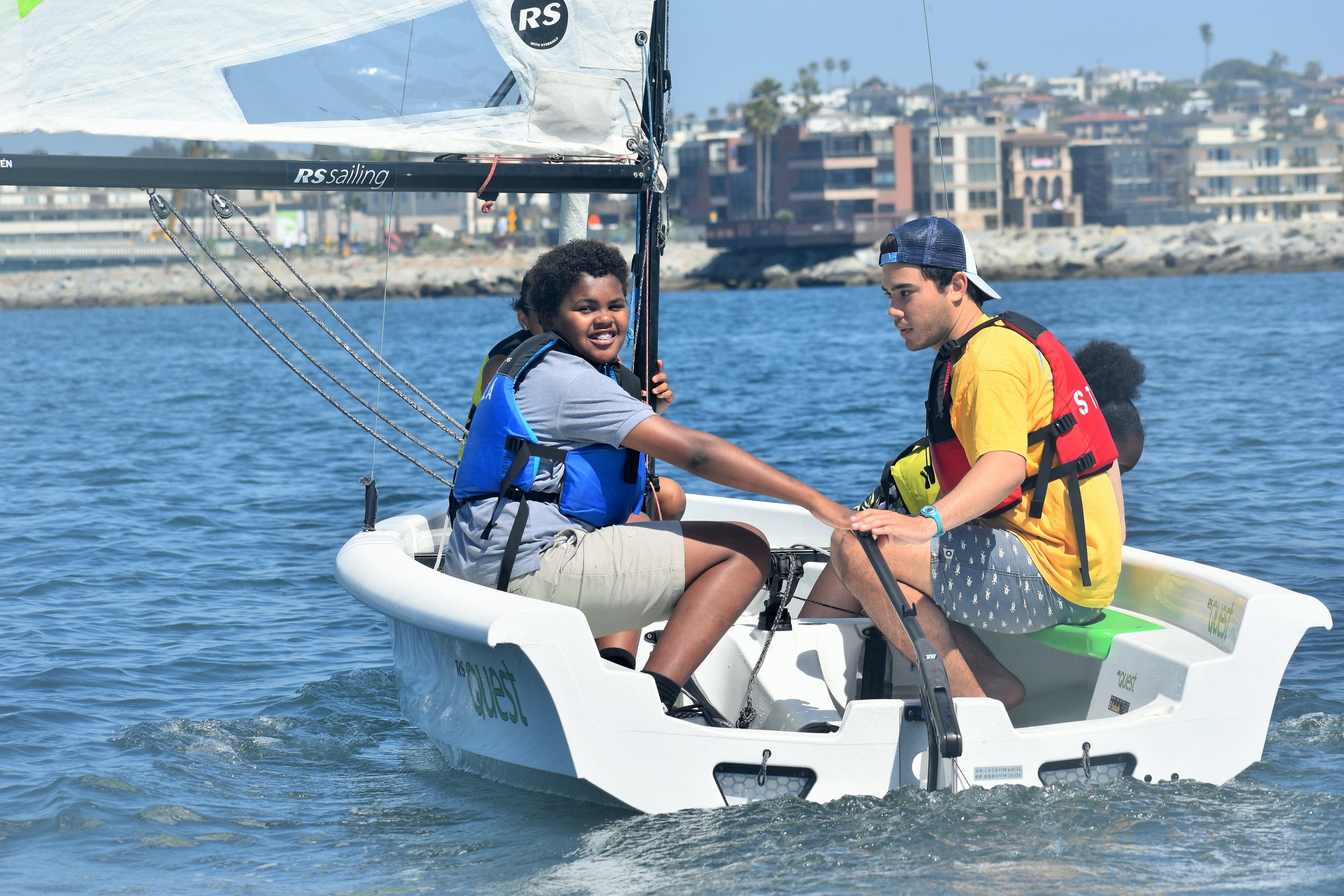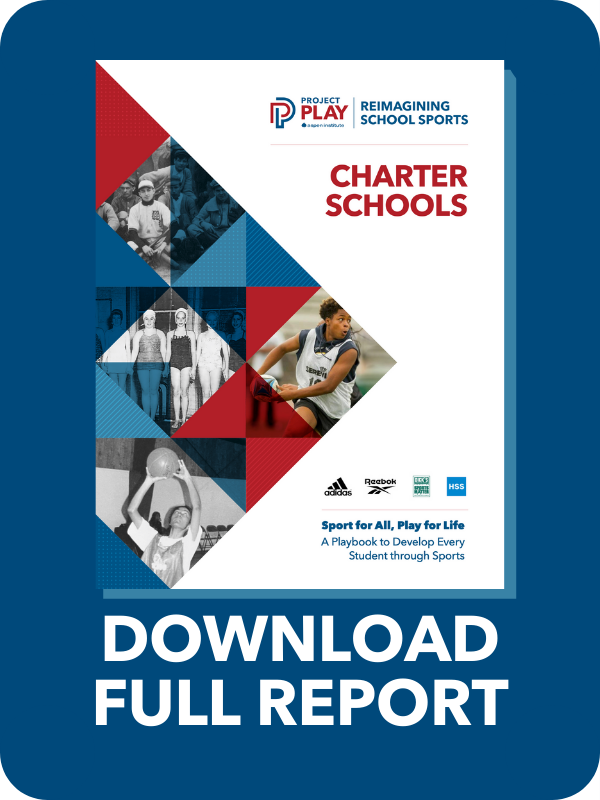Charter School winner:
ICEF View Park Preparatory School
Los Angeles, California
It’s Thursday afternoon in the Crenshaw District of south Los Angeles, a year into the pandemic. From the sun-splashed porch behind her single-story home, 16-year-old Kimorri Boozer leads a fitness workout to the Bee Gees’ anthem Stayin’ Alive. Her audience is on Zoom, a dozen kids from K-8 schools affiliated with the charter high school she attends, ICEF View Park Preparatory School.
She shakes a rugby ball back and forth, exhorting them to move. Some do. She closes with an oral exercise, asking, “What superpower would you want to have?”
A girl laying on her belly says “superspeed” because fast is cool. Another says “superstrength.” A boy suggests “read minds.” Another says, “fly.” Kimorri’s rugby coach, Elona Williams, offers a nod to “the power of teleportation.”
Here’s the thing about View Park: Versions of each of these dreams await if they move on to the high school where Kimorri is now a junior. They might whip down a slope on a snowboard at Big Bear, a mountain retreat to the east of the city. They might power their way through a stiff wind on a sailboat at Marina del Rey. They might even jet to Japan, Brazil, or the South Pacific, with the school rugby teams.
Kimorri traveled to Tanzania as a freshman member of the girls’ rugby team. She stayed at the home of a host family. Hiked to a waterfall. Played games and reflected.
“Rugby helped me see beyond L.A.,” she says. “You realize there’s a world around you and so many people who can help you.”
Rugby is the defining program at View Park, underwritten by $100,000 in annual donations raised from true believers in the power of the sport to foster learning. But the charter’s sports portfolio is so broad that already Kimorri has sampled 12 activities, from track to skateboarding, soccer to tennis, surfing to dance.
It’s that variety that makes View Park the charter school winner in Project Play’s national search for the most innovative school sports programs in the country. Research shows that students who play multiple sports do better academically and behaviorally than those who specialize in just one. “Significant differences” have been found in GPAs and days suspended from school. Among the charter school finalists, View Park stood out for providing so many sport options.
And, against all odds. Consider: View Park has no facilities on site to play games. No gym. No full field. No track. Yet it offers 10 interscholastic teams, five intramural programs, strength training, general fitness classes, a cutting-edge P.E. program, and an afterschool action sports program that includes surfing.
That’s extraordinary for any school with 450 students. It’s especially remarkable for a charter school, less than half of which nationally offer interscholastic sports teams – with only 19.3% of students, at most, participating. At View Park, 37% of students played a sport, in all forms, in the year before the COVID shutdown.
“We go to public parks to do everything,” says Stuart Krohn, director of ICEF’s Student Leadership Academy and the founder of its rugby program.
The parks can be dangerous, enough so that some parents won’t let their child play sports. Crenshaw is the community that inspired the 1991 John Singleton film Boyz n the Hood, and gang violence remains an ever-present threat. Local rapper Nipsey Hussle was shot just outside school grounds in 2019. Three years earlier, Krohn says, the rugby teams had to hit the ground to avoid errant bullets in a drive-by shooting in the park where they practiced.
“We used to park our bus in the parking lot where the gang members hang out,” he says. “Now, we park down the way and walk up.”
View Park officials persevere because sports are essential to the whole-child educational concept of the school, expressed as “Academics, Arts and Athletics.” There’s a heavy lean toward what scientists call “open skill” sports, which includes team sports, that require active decision-making and have been shown to better promote cognitive function than other sports. But sports of most types are good. The school’s crisp, clear mission statement calls for “each student to develop an appreciation for an active lifestyle, good character, and a positive self-image.”
The secret in the school’s sports sauce is partnerships. With UCLA for the sailing program. With USC to develop a sports-sampling P.E. curriculum that Kimorri describes as “fun” instead of “making it like we’re doing it for the grade.” View Park officials have been enterprising grant writers, securing $1.8 million from the federal government in 2013 to launch the P.E. program, which in turn boosted its sport culture.
It’s an effective strategy, certainly in charters. The Aspen Institute’s national youth survey shows that 10% of charter school students said that trying a sport in P.E. made them want to play that sport at school – twice the national average. View Park also has won grants from ESPN and the Women’s Sports Foundation to develop girls’ programs, and from the LA84 Foundation’s Play Equity Fund to underwrite general operations. The Positive Coaching Alliance and U.S. Tennis Association provide coach training, the latter at View Park’s affiliated middle school.
That middle school is a key ingredient in its model. View Park starts introducing sports such as rugby in fifth grade through entry-level versions like flag rugby that open young minds to the possibilities – that Black kids in urban areas can play sports well beyond the usual limited menu of basketball, football, track and other traditional sports. Athletes on the high school teams help coach the rugby players, which in turn facilitates their leadership skills, a focused priority at View Park.
In the communities where the Aspen Institute has landscaped the state of play, student surveys have often revealed an appetite for non-traditional sports. In East Harlem, a largely Latino area, it was hockey. In Hawaii, it was winter sports (!). In Central Ohio, Black students told us they want to try rock climbing, karate and swimming. The takeaway: Many kids want to explore. They seek self-discovery.
View Park facilitates as much. It created a project-based course on action sports, which is how Kimorri was introduced to skateboarding and surfing. And it organizes those rugby trips that expand worldviews. After returning from Tanzania, Kimorri joined an entrepreneurship program that took her to Montana, where she shared a whitewater raft and housing with area students.
She came home and started her own business, a clothing line. “It’s called Rich Kingdom Mentality,” she wrote in an essay. “It means that before you become rich, you have to have the mentality that your dreams will become reality.”
View Park’s sports program isn’t perfect. It has just one athletic trainer, a part-timer who attends football and rugby games. Krohn said the school wants to find the funding for a full-time athletic trainer. The challenge: That can cost more than the $29,700 it spends on the rest of the football program. The total athletic department budget is $153,714, not including funds raised for rugby teams’ international trips.
Other charters may find the View Park model challenging to adopt. A former rugby player in Hong Kong whose passion for the sport runs deep, Krohn is a force of nature. So is Lisa Finnegan, a high-energy innovator from Ireland who drives the P.E. program. These are dynamic leaders who have the support of their principal. They also have benefit of working in the world’s movie capital, where filmmakers have shared the View Park story in different forms with audiences over the years.
However, Krohn insists, “We have the template. It can be replicated.”
The rugby piece certainly has inspired imitators. In Tennessee, several young teachers learned about View Park nine years ago. “We said maybe this could be us one day,” says Shane Young, executive director of Memphis Inner City Rugby, a community organization that now works with 11 high schools to field teams.
Like at other urban schools that have adopted rugby, players at View Park have gone on to compete in college. Some return to coach, like Kimorri’s coach Elona. Nurturing that pipeline, which View Park does across sports, helps give students adults who they can relate to (nine of 10 coaches at the school are Black).
Krohn and the coaches also talk about keeping sports in proper perspective. “I was a super competitive, insane guy when I played,” he says. “Then as a coach I was like that. What really changed me was seeing myself on film. I didn’t like it. I’ve come to believe that the most important thing in high school sports is getting as many kids playing as you can and having fun.”
From fun, personal development grows. That can be a challenging idea in school sports programs where the goals of winning and excellence are mission central. Not at View Prep, where the lessons learned by a first-time surfer are paramount.
Kimorri recalls her first ride. She had been to the beach before, weekend days at the Santa Monica Pier with her mother, a special education teacher at View Park. But she didn’t like to get her hair wet, didn’t swim all that well, and never went in very far. View Park created the conditions to take that next step.
Along with teammates who were given a water safety course, she was bused an hour north to Malibu. She grabbed her board, and with the guidance of instructors, paddled out to try and catch a wave. She failed, again and again. But she knew from rugby that “when you fall, you just gotta keep getting back up.”
Then, suddenly, Kimorri was up. Standing, thinking, feeling, believing.
“I was like, I’m flying! I’m gliding!” she says.
A superhero to herself, wanting more.
Strategies that ICEF View Park Preparatory School uses that stood out as exemplary to the Aspen Institute and Project Play’s Reimagining School Sports Advisory Committee:
Help them sample sports
Young people want to explore. Introduce them to sports that they may be curious about but have lacked the opportunity to play. And don’t wait until high school. Offer to place entry-level or casual play programs at local middle school(s), with high school athletes helping to supervise.
“Partner with everyone”
That’s the advice of View Park leaders, who couldn’t host any sports programming if not for a robust set of community partnerships. Get to know your local parks and rec director who controls access to fields and gyms. Collaborate with local universities on programs and curriculum.
Don’t accept no
View Park leaders are avid fundraisers. They look for grant opportunities from private and government sources, both locally and nationally. They go to events and network. They make asks and keep asking. They are persistent and tell their story. They are edupreneurs (our term).




